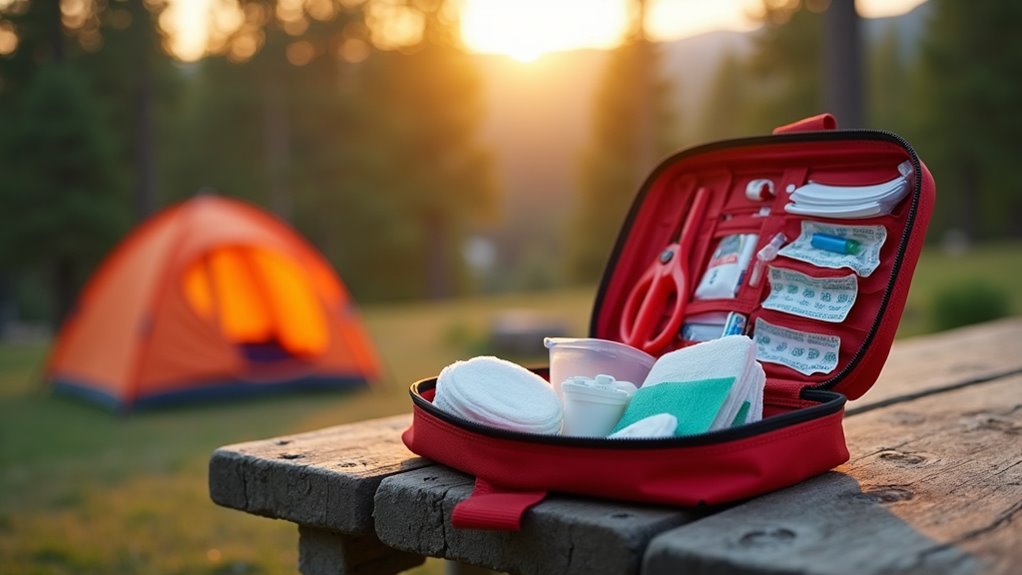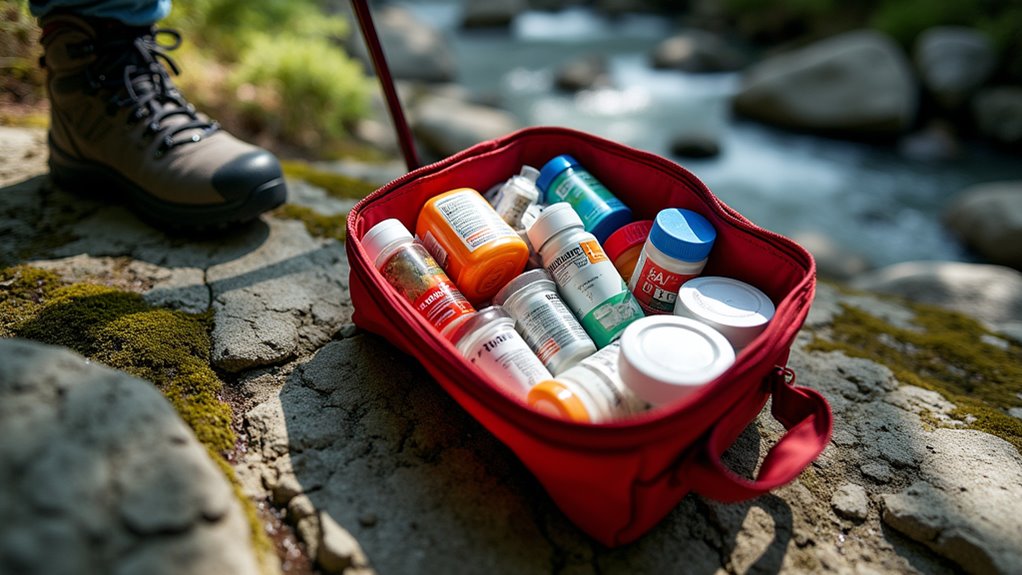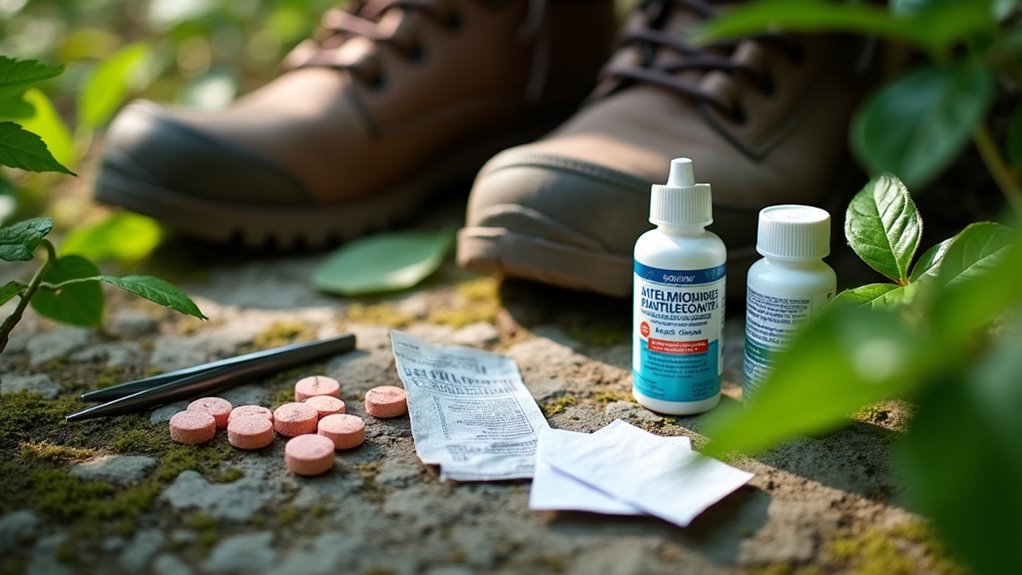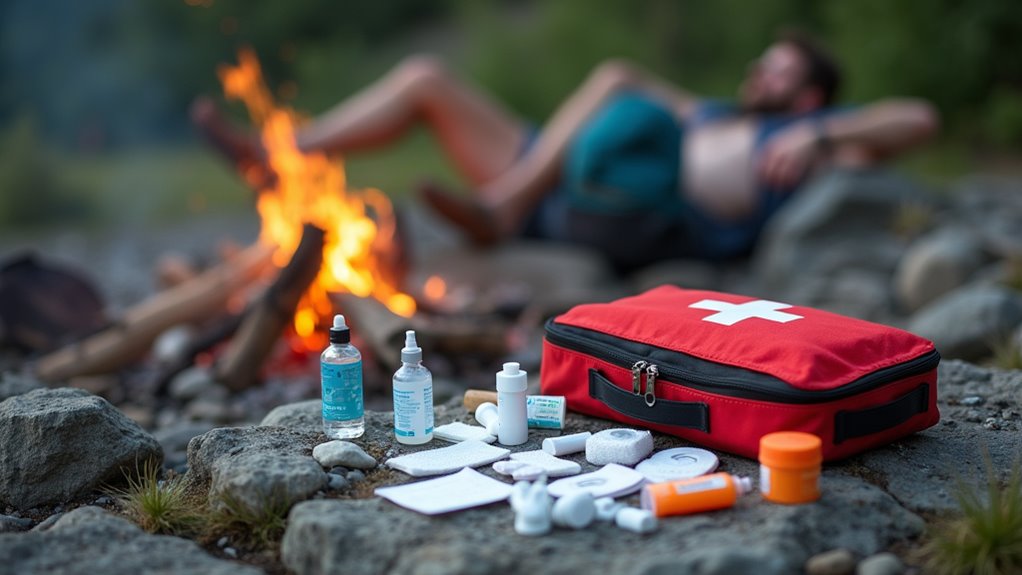Physical Address
304 North Cardinal St.
Dorchester Center, MA 02124
Physical Address
304 North Cardinal St.
Dorchester Center, MA 02124

One essential item prevents camping trips from turning into dangerous emergencies that could leave you stranded miles from help.
Last summer, a family camping in Yellowstone faced a crisis when their 8-year-old daughter suffered a deep gash from a sharp rock while hiking. Without a proper first-aid kit, they couldn’t stop the bleeding effectively and had to make an emergency drive to the nearest hospital two hours away. You don’t want to find yourself in this preventable situation. A well-prepared first-aid kit can mean the difference between a minor inconvenience and a camping disaster that cuts your adventure short.

When you’re miles from the nearest hospital, a well-stocked first-aid kit becomes your frontline defense against minor injuries and medical emergencies.
Start with adhesive bandages in various sizes, sterile gauze pads, and medical tape for wound care. Include antiseptic wipes, antibiotic ointment, and hydrogen peroxide to prevent infections.
Basic wound care supplies form the foundation of any effective first-aid kit, with proper antiseptics being crucial for preventing dangerous infections.
Pack pain relievers like ibuprofen and acetaminophen, plus any personal medications. Don’t forget tweezers for splinter removal, scissors for cutting tape or gauze, and a thermometer to monitor fevers.
Add instant cold packs for sprains, elastic bandages for support, and disposable gloves for protection. Include a first-aid manual and emergency contact information.
Store everything in a waterproof container that’s easily accessible. Having the perfect first aid kit ensures you’re prepared for whatever challenges nature might present during your outdoor adventure.
Even with careful planning, accidents happen in the wilderness, and knowing how to respond quickly can make the difference between a minor setback and a serious emergency. Cuts and scrapes are the most frequent camping injuries. Clean wounds with antiseptic wipes, apply antibiotic ointment, and cover with bandages.
For burns from campfires or cooking equipment, run cold water over the area immediately, then apply burn gel and cover loosely.
Sprains often occur on uneven terrain – use the RICE method: Rest, Ice, Compression, and Elevation.
Bug bites and stings require antihistamines for allergic reactions and topical treatments for itching. Keep insect repellent handy for prevention.
Always monitor injuries for signs of infection like increased pain, swelling, or red streaking.
When camping with children, ensure their sleeping bags are properly sized and rated for the expected temperatures to prevent hypothermia-related emergencies.

Beyond basic first-aid supplies, you’ll need a well-stocked medication kit to handle common health issues that arise during outdoor adventures. Pack pain relievers like ibuprofen and acetaminophen for headaches, muscle aches, and fever.
Include antihistamines such as Benadryl for allergic reactions and insect bites. Don’t forget anti-diarrheal medication like Imodium for stomach troubles from unfamiliar water or food.
Bring hydrocortisone cream for rashes and skin irritation. Pack throat lozenges and cough drops for respiratory discomfort. Include any personal prescription medications with extras in case your trip extends.
Add electrolyte packets for dehydration and antacids for indigestion.
Store medications in waterproof containers and check expiration dates before departure. Keep a written list of what’s included and dosage instructions for each medication. Having a comprehensive first aid kit becomes even more critical when camping with children, who are more prone to accidents and injuries during outdoor activities.
While medications handle internal issues, you’ll need proper tools and supplies to manage external injuries that can occur during camping trips. Cuts, scrapes, and puncture wounds require immediate attention to prevent infection and promote healing.
Your wound care arsenal should include sterile gauze pads, medical tape, and antiseptic wipes for cleaning injuries. Pack tweezers for removing splinters or debris, and include various bandage sizes for different wound types. Don’t forget scissors for cutting tape and gauze to appropriate sizes.
Essential wound care supplies for your camping first-aid kit:
Having a well-stocked first aid kit can make the difference between a minor inconvenience and a trip-ending emergency.

Although wound care addresses traumatic injuries, you’ll face equally challenging threats from the living environment around your campsite. Mosquitoes, ticks, bees, and wasps pose immediate risks, while poison ivy, oak, and sumac create delayed reactions that can ruin your trip.
Pack antihistamines like Benadryl for allergic reactions and topical treatments such as calamine lotion or hydrocortisone cream. Include tweezers for tick removal and insect repellent containing DEET. Don’t forget an EpiPen if you have severe allergies.
When stung or bitten, clean the area immediately and apply cold compresses to reduce swelling. Remove stingers by scraping sideways with a credit card rather than pinching.
For plant exposure, rinse with cold water within minutes to prevent oils from penetrating your skin.
Just as you might consider whether to rent or buy equipment for outdoor activities, weigh the costs of a comprehensive first-aid kit against renting specialized gear for specific camping adventures.
When campfires, hot cooking equipment, and intense sun combine with outdoor activities, burns and heat-related injuries become serious concerns that require immediate attention.
For minor burns, immediately cool the area with clean water for 10-15 minutes. Don’t use ice, as it’ll damage tissue further. Cover with sterile gauze after cooling.
For severe burns or heat exhaustion, seek medical help immediately while moving the person to shade and applying cool, wet cloths.
Prevention’s your best strategy:
Heat stroke requires emergency evacuation, so don’t hesitate to call for help.
Expecting mothers should take extra precautions with heat-related safety measures, as pregnancy increases susceptibility to overheating and dehydration.

How do you know when a camping injury has moved beyond basic first aid into serious medical territory? Trust your instincts—if something feels seriously wrong, it probably is.
Call for emergency help immediately if you notice difficulty breathing, chest pain, severe bleeding that won’t stop, signs of shock like pale skin and rapid pulse, or loss of consciousness.
Head injuries with confusion, repeated vomiting, or severe dizziness require professional care.
Watch for infection signs: red streaking from wounds, fever, or pus. Burns covering large areas or third-degree burns need hospital treatment.
Broken bones, especially if bone’s visible or limbs appear deformed, aren’t campsite fixes.
Don’t hesitate to evacuate when you’re unsure. It’s better to overreact than face serious consequences later.
If you become lost while seeking help, remember that wilderness survival requires staying calm, conserving energy, and making yourself visible to rescue teams.
Having a well-stocked first-aid kit won’t help much if half your supplies have expired or aren’t suited for the conditions you’ll face. You need to review and refresh your kit regularly, adapting it for each season’s unique challenges.
A first-aid kit with expired supplies is like having no kit at all when emergencies strike.
Check expiration dates every six months and replace outdated medications, ointments, and sterile supplies. Summer camping requires extra sunscreen, insect repellent, and heat-related treatments. Winter adventures need hand warmers, lip balm, and hypothermia supplies. Spring and fall demand allergy medications and waterproof storage.
Consider incorporating these maintenance practices with other adventurous camping tricks to create a comprehensive safety routine that enhances your outdoor experiences.
You might think a first-aid kit adds unnecessary weight to your pack, but you’ll appreciate having it when accidents happen miles from help. Don’t let a minor cut or bee sting ruin your adventure because you weren’t prepared. Pack smart by choosing lightweight, multi-purpose supplies that won’t bog you down. Your safety’s worth the extra ounces, and you’ll camp with confidence knowing you’re ready for whatever nature throws your way.